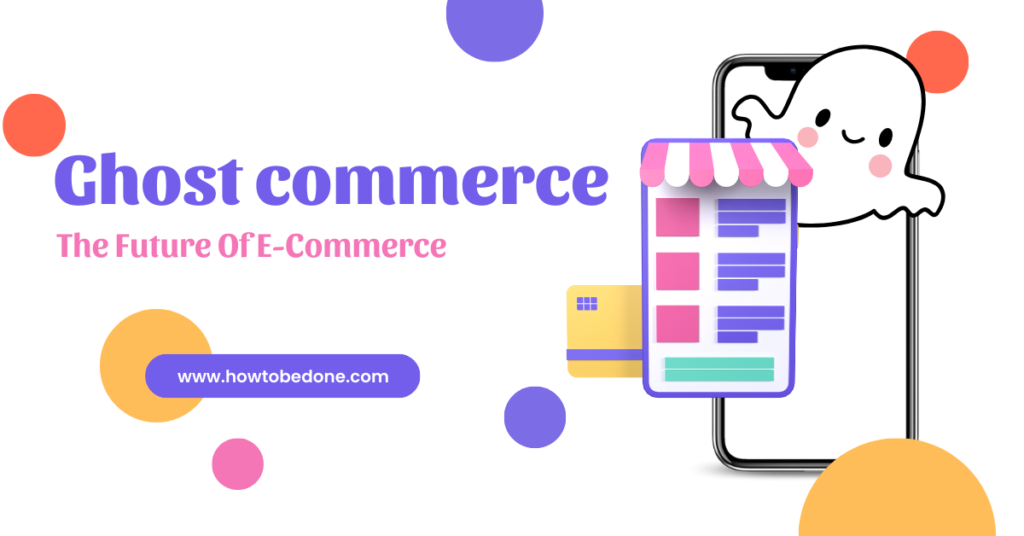Are you tired of the traditional e-commerce model, with its inventory management and physical stores? If so, then Ghost Commerce might be the answer you’ve been searching for. This innovative approach allows you to sell products online without ever owning or storing them yourself. Intrigued? Read on to discover the secrets of Ghost Commerce, including its benefits, strategies, and potential to revolutionize the e-commerce landscape.

Table of Contents
What is Ghost Commerce and How Does It Work?
Ghost commerce, also known as headless commerce or D2C (direct-to-consumer) commerce, is an innovative e-commerce model where businesses sell products online without holding any physical inventory or managing a traditional online store. Instead, they leverage partnerships with third-party companies to handle product storage, fulfillment, and customer service.
Understanding the Basics
Think of ghost commerce as the “invisible” operator behind the scenes. You curate and promote products online, but never actually touch them yourself. Imagine it like an online marketplace without the storefront. Here’s a breakdown of the main parts:
Unpacking the Terminology
While “ghost commerce” is the most popular term, several other terms are used interchangeably:
- Headless commerce: This term emphasizes the separation of the front-end (website or app) and back-end (inventory management and fulfillment) systems.
- D2C commerce: This term highlights the direct sales relationship between brands and consumers, eliminating intermediaries.
- Invisible commerce: This term emphasizes the seamless and integrated nature of the customer experience, where the “commerce” aspect is hidden behind the scenes.

Ghost Commerce vs. Affiliate Marketing
Although both involve selling products online without owning inventory, there are key distinctions between ghost commerce and affiliate marketing:
- Involvement: Ghost commerce involves a deeper partnership with manufacturers and fulfillment companies, often requiring contractual agreements. Affiliate marketing usually involves promoting products through simple online links.
- Control: Ghost commerce offers more control over branding, product selection, and customer experience. Affiliate marketing relies on the branding and customer experience of the partner website.
- Profit margins: Ghost commerce potentially offers higher profit margins due to direct sales and reduced reliance on commission-based partnerships.
You want to Get Free Stuff On TEMU with 8 Proven Ways? Click Here
The Rise and Impact
The Growing Popularity of Ghost Commerce
Ghost commerce has emerged as a disruptive force in the e-commerce world, experiencing rapid growth in recent years. There are several main reasons for this trend:
- Technological advancements: The rise of social media, influencer marketing, and e-commerce platforms have created a fertile ground for ghost commerce to thrive.
- Shifting consumer preferences: Today’s customers are increasingly tech-savvy and value convenience. They are more inclined towards online shopping and appreciate streamlined purchase experiences.
- Reduced barriers to entry: Ghost commerce offers a low-risk and low-investment business model, making it accessible to entrepreneurs and small businesses.
- Greater profitability: By eliminating inventory management and physical store costs, businesses can generate higher profit margins with ghost commerce.
These factors have propelled ghost commerce towards mainstream adoption. According to a report by Shopify, the global ghost commerce market is expected to reach $30 billion by 2025, showcasing its immense potential.
Impact on Businesses and the E-commerce Landscape
The rise of ghost commerce is transforming the e-commerce landscape in several significant ways:
- Increased competition: With the ease of entry, ghost commerce has led to increased competition within online markets. This forces traditional e-commerce businesses to adapt and innovate to remain competitive.
- Focus on customer experience: Ghost commerce emphasizes seamless and frictionless customer journeys. This necessitates a greater focus on user experience design and personalized marketing strategies.
- Rise of influencer marketing: Ghost commerce heavily relies on influencer marketing to reach target audiences and drive sales. This creates new opportunities for influencers and brands to collaborate.
- Evolving data analytics: Businesses are increasingly leveraging data analytics to optimize their ghost commerce operations. This allows them to personalize marketing efforts, track campaign performance, and make informed decisions.
The impact of ghost commerce extends beyond individual businesses, shaping the overall e-commerce landscape. It is leading towards a more dynamic and competitive environment, where customer experience and data-driven decision-making are paramount.
Learn About How to Get Cash App Barcode to Load Money Click here
Pros and Cons of Ghost Commerce
While ghost commerce offers numerous benefits, it also comes with potential downsides:
Pros:
- Low investment: No need for inventory or physical stores, reducing initial startup costs.
- Scalability: Easy to scale operations based on demand without significant additional investment.
- Flexibility: Offers the freedom to work remotely and manage your business from anywhere.
- Wider reach: Access to a global audience through online platforms and influencer marketing.
- Brand building: Build a strong brand identity without the burden of managing a physical store.

Cons:
- Limited product control: You rely on your partner companies for product quality and fulfillment.
- Competition: Highly competitive market with numerous players vying for attention.
- Marketing dependence: Requires ongoing marketing efforts to drive traffic and generate sales.
- Data security concerns: Sharing customer data with partner companies raises data security concerns.
- Uncertain legal landscape: Regulatory landscape surrounding ghost commerce is still evolving.
It is crucial to weigh the advantages and disadvantages of ghost commerce before deciding if it is the right fit for your business. Carefully consider your resources, target audience, and risk tolerance to make an informed decision.
How Long Does Temu Take to Ship?… You wanna know then Click Here
Leveraging Ghost Commerce
Building a Strong Online Presence
The foundation of successful ghost commerce lies in a strong online presence. This requires a strategic approach to building brand awareness, attracting targeted traffic, and fostering customer engagement. Here are some key steps:
- Develop a visually appealing and user-friendly website: Your website acts as your online storefront, showcasing your brand and products. Invest in professional design, clear navigation, and high-quality product images.
- Optimize your website for search engines (SEO): Implement SEO best practices to ensure your website ranks high in relevant search results, increasing organic traffic and brand visibility.
- Leverage social media platforms: Build a strong presence on social media platforms relevant to your target audience. Actively engage with your followers, share valuable content, and run targeted ad campaigns.
- Utilize content marketing: Create informative and engaging content related to your products and niche. This can include blog posts, articles, videos, infographics, and social media posts.
- Build email marketing lists and nurture leads: Capture email addresses through website opt-in forms and social media campaigns. Build targeted email sequences to nurture leads, provide valuable information, and drive sales.
Focusing on Customer Experience
In the absence of a physical store, customer experience becomes even more critical in ghost commerce. Ensure a seamless buying journey with fast loading times, easy checkout procedures, transparent pricing, and excellent customer service. Here are some tips:
- Make product information readily available: Provide detailed product descriptions, high-quality images and videos, and customer reviews.
- Offer multiple payment options: Integrate various payment gateways to cater to diverse customer preferences.
- Ensure fast and reliable shipping: Partner with reliable fulfillment companies offering efficient delivery options.
- Provide responsive and helpful customer support: Offer multiple channels for customer support, such as live chat, email, and phone.
Personalize the customer experience: Utilize data analytics to personalize product recommendations, email marketing, and other interactions.
Leveraging Data Analytics
Data analytics plays a crucial role in optimizing your ghost commerce operations. By analyzing website traffic, customer behavior, and campaign performance, you can gain valuable insights and make data-driven decisions to improve your success. Here are some ways to benefit from data analytics:
- Track website traffic: Monitor key metrics like website traffic, bounce rate, and conversion rate to understand how users interact with your website.
- Analyze customer behavior: Track customer purchase history, product preferences, and engagement levels to personalize marketing efforts and product recommendations.
- Measure campaign performance: Analyze the effectiveness of your marketing campaigns, including social media ads, email campaigns, and influencer partnerships.
- Identify trends and patterns: Use data analytics to identify emerging trends and customer preferences, allowing you to adapt your offerings and strategies accordingly.
- Optimize pricing and promotions: Analyze customer purchase data to set optimal pricing strategies and launch targeted promotions.

Partnering with Influencers
Influencer marketing can be a powerful tool for ghost commerce businesses. By collaborating with relevant influencers, you can tap into their existing audience, build brand awareness, and drive targeted traffic to your website. Here are some key considerations for successful influencer marketing:
- Choose the right influencers: Partner with influencers who align with your brand values, target audience, and niche.
- Create authentic and engaging content: Collaborate with influencers to create content that is relevant, valuable, and resonates with their audience.
- Track and measure results: Monitor the impact of your influencer marketing campaigns to ensure they are driving the desired results.
- Build long-term relationships: Develop long-term relationships with key influencers to ensure consistent brand messaging and reach a wider audience.
By integrating these strategies, ghost commerce businesses can build a strong online presence, prioritize customer experience, leverage data analytics, and partner with influencers for successful operations and growth.
Shipping Secrets of Cider, how long does they take to Ship Your Style in 2023? Click Here
Implementation and Operations
Market Research and Niche Selection
Before diving in, thorough market research is crucial to identify a profitable niche and understand your target audience. Analyze current market trends, identify customer needs and pain points, and assess the competition. This will help you select a niche with strong potential and develop a targeted marketing strategy.
Finding Reliable Partner Companies
Your ghost commerce success depends heavily on reliable partner companies. Conduct thorough research to find reputable manufacturers, wholesalers, and fulfillment centers that align with your brand values and operational needs. Consider factors like product quality, pricing, shipping rates, customer service, and scalability to ensure a smooth and efficient operation.
Building Yourself a Website
Your website is the cornerstone of your online presence. Choose a user-friendly platform, invest in professional design and development, and ensure a seamless user experience. Focus on clear navigation, high-quality product images and descriptions, and an intuitive checkout process.
Traffic Generation Strategies
Once your website is ready, you need to attract targeted traffic. Implement various traffic generation strategies, including:
- Search Engine Optimization (SEO): Optimize your website content and meta descriptions for relevant keywords to improve search engine ranking.
- Social Media Marketing: Build a strong presence on relevant social media platforms and engage with your audience. Run targeted ads and collaborate with influencers.
- Content Marketing: Create informative and valuable content related to your niche, such as blog posts, articles, and videos. Promote your content through social media and email marketing.
- Paid Advertising: Consider running paid advertising campaigns on search engines, social media platforms, and other relevant websites.
Paid Advertising: Consider running paid advertising campaigns on search engines, social media platforms, and other relevant websites.

Branding and Marketing Efforts
Building a powerful brand identity is essential to long-term success. Develop a unique brand voice, design a recognizable logo and visual assets, and create consistent messaging across all your marketing efforts. Utilize various marketing channels, including social media, email marketing, influencer collaborations, and content marketing, to build brand awareness and drive sales.
Here are some additional resources:
- Shopify: https://www.shopify.com/
- BigCommerce: https://www.bigcommerce.com/
- WooCommerce: https://woo.com/
- Oberlo: https://www.oberlo.com/
- Printful: https://www.printful.com/
- DropshipMe: https://dropship.me/
By carefully implementing these strategies, you can establish a strong foundation for your ghost commerce business and pave the way for sustainable growth.
Benefits and Potential
Ghost Commerce as a Passive Income Stream:
One of the most appealing aspects of ghost commerce is its potential to generate passive income. By building a strong online presence and driving consistent traffic to your website, you can earn ongoing revenue without actively managing inventory or fulfilling orders. This allows you to focus on other aspects of your business or pursue other interests while still enjoying a steady income stream.

Easy and Fast Cash:
Compared to traditional e-commerce businesses, ghost commerce offers a quicker and more accessible entry point. You don’t need to invest in a large inventory upfront, lease a physical store, or manage complex logistics. This makes it ideal for aspiring entrepreneurs and individuals with limited resources.
Low-Risk Business Model:
Ghost commerce minimizes the financial risk associated with traditional e-commerce. By relying on partner companies for inventory and fulfillment, you avoid the risks of unsold inventory, warehousing costs, and product damage. This allows you to test your business idea and scale your operations gradually with minimal financial risk.
Marketing without Responsibility:
With ghost commerce, you can focus on marketing and brand building without the burden of inventory management and order fulfillment. This allows you to dedicate more time and resources to creating engaging content, building relationships with influencers, and expanding your reach to a wider audience.
How Bloggers are Making Money with Affiliate Links
Time Management:
Ghost commerce offers a flexible work schedule and allows you to manage your business from anywhere with an internet connection. This eliminates the need for a traditional office space and provides you with greater control over your time.
Accessibility:
Ghost commerce opens up opportunities for global business expansion without geographic limitations. You can reach customers worldwide through your online presence and partner with international companies for product sourcing and fulfillment.
Ghost Commerce Strategy: The Future of Ecommerce
The rise of ghost commerce signifies a fundamental shift in the e-commerce landscape. By offering a cost-effective, scalable, and flexible business model, ghost commerce is poised to revolutionize the way we shop and conduct business online.
Is Ghost Commerce Right for You?
Whether ghost commerce is the right fit for you depends on your individual goals, resources, and risk tolerance. Carefully consider the advantages and disadvantages of this business model and conduct thorough research to assess its viability for your specific niche and target audience.
Overcoming Challenges and Risks
Although ghost commerce offers numerous benefits, it also comes with potential challenges and risks. Here are some key considerations:
- Maintaining product quality and consistency: You rely on partner companies to ensure product quality and consistency. Conduct thorough research and establish clear quality control measures to avoid customer dissatisfaction.
- Managing supplier relationships: Building strong relationships with your suppliers is crucial for smooth operations and timely deliveries. Establish clear communication channels, set realistic expectations, and promptly address any issues.
- Data security and privacy: You entrust customer data to your partner companies. Ensure they comply with data security regulations and have robust measures in place to protect sensitive information.
By understanding these challenges and proactively managing them, you can mitigate risks and ensure the long-term success of your ghost commerce business.
Milwaukee Tool Tester Program: Your Comprehensive Guide 2023 Click Here
The Future of Ghost Commerce

Exploring the Potential of Ghost Commerce
Ghost commerce is rapidly gaining traction and has the potential to reshape the future of e-commerce. Its low-risk nature, flexibility, and scalability make it particularly appealing to entrepreneurs and established businesses alike. Here are some key areas where ghost commerce can revolutionize the market:
- Personalized shopping experience: Ghost Commerce can use data analytics to personalize product recommendations, deliver personalized offers, and provide individual customers with a more pleasant and relevant shopping experience
- Omnichannel Integration: Ghost Commerce can seamlessly integrate with various online and offline marketing channels, providing a unified customer experience across multiple touchpoints
- Going global: By eliminating geographic boundaries, ghost marketing can enable companies to reach a global audience and expand their market significantly.
- Lifting Niche Brands: Ghost commerce empowers entrepreneurs to create niche brands and meet specific consumer needs without requiring a significant upfront investment.
- Empowering Creators and Influencers: Ghost Commerce offers new ways for creators and influencers to monetize their content and build sustainable businesses.
- Focus on sustainability: Ghost trading can contribute to sustainable e-commerce practices by reducing packaging waste and reducing the need for stores and warehouses simply on the various.
Success Strategies for Implementation
For successful ghost commerce implementation, several key strategies are crucial:
- Building a strong brand identity: Develop a unique brand voice, create consistent branding across all platforms, and establish a strong online presence.
- Focusing on customer experience: Prioritize a seamless customer journey, offer excellent customer service, and personalize the shopping experience.
- Leveraging data analytics: Utilize data to understand customer behavior, optimize marketing campaigns, and make informed business decisions.
- Partnering with reliable companies: Choose reputable manufacturers, wholesalers, and fulfillment centers to ensure high-quality products and efficient operations.
- Staying informed about regulations: Continuously monitor and adapt to evolving legal and regulatory landscape surrounding ghost Trade.
Is Ghost Commerce Profitable?
Ghost commerce can be highly profitable, offering higher profit margins compared to traditional e-commerce models. This is due to reduced inventory costs, lower overhead expenses, and the ability to scale operations efficiently. However, profitability depends on various factors, e.g.
- Profit margin of the product: Choose products with a higher profit margin to compensate for the potential costs of fulfillment and marketing.
- Cost-effectiveness of partners: Partnering with reliable and cost-effective manufacturers, wholesalers, and fulfillment centers is crucial for maximizing profits.
- Marketing strategy: Effective marketing strategies can drive targeted traffic, convert more visitors into customers, and ultimately increase profitability.
Reasons Why Ghost Commerce Could be the Future of E-commerce

Several factors contribute to why ghost trade could become the dominant model in the future:
- Changing consumer preferences: Consumers are becoming increasingly tech-savvy and value convenience, personalization and fast delivery, which ghost shopping excels at providing.
- Technological Advances: Advances in AI, data analytics and automation are further enhancing the capabilities and effectiveness of ghost trading operations
- Changing e-commerce landscape: Traditional e-commerce platforms are facing challenges such as increasing competition and rising operating costs, making ghost trading an increasingly attractive option
- The rise of influencer marketing: The rise of influencer marketing greatly benefits ghost marketing businesses by leveraging the influence and credibility of influencers to drive sales.
- Focus on sustainability: Ghost marketing is the increasing focus on sustainability by reducing waste and the impact of e-commerce activities on products a the environment around us.
Examples and Case Studies
Several successful ghost commerce businesses showcase its potential:
Dollar Shave Club: This popular men’s grooming brand operates entirely through ghost Trading, offering high-quality products at affordable prices.
Glossier: This beauty brand uses ghost commerce to create a curated and personalized customer experience, driving rapid growth and loyal following.
Away: This luggage brand utilizes ghost trading to offer premium travel products directly to consumers, bypassing traditional retail channels.
These are just a few examples of how ghost commerce is revolutionizing various industries. As the model continues to evolve and gain traction, more innovative and successful case studies will emerge.
Is Ghost Commerce Legit?
Yes, ghost commerce is a legitimate and legal business model. However, it’s crucial to operate within legal and regulatory frameworks and ensure transparency with customers. This includes displaying accurate product information, providing clear terms and conditions, and respecting data privacy regulations.
What is a Ghost Commerce Retailer?
A ghost commerce retailer is a business that operates entirely online without a physical store. They partner with other companies for product sourcing, warehousing, fulfillment, and customer service.
How to Make Money with Ghost Commerce?
There are several ways to make money with ghost commerce:
- Selling your own products: Develop your own product line and sell it through your online store.
- Affiliate marketing:
Is Ghost Commerce Right for You?
Assessing Individual Suitability
Before embarking on your ghost commerce journey, carefully assess if it aligns with your individual goals, skillset, and risk tolerance. Consider the following questions:
Are you comfortable not owning inventory or managing physical stores?
Ghost commerce requires a shift from traditional inventory management to relying on partner companies. This can be liberating for some entrepreneurs, but others may feel uneasy relinquishing control over core aspects of their business.
Do you possess strong marketing and branding skills?
Ghost commerce success relies heavily on effective marketing and branding strategies to attract customers and build brand awareness. Evaluate your marketing skills and consider investing in professional resources if needed.
Are you comfortable taking calculated risks?
While ghost commerce offers lower initial investment compared to traditional e-commerce, it also involves inherent risks like dependence on partner companies and potential legal uncertainties. Ensure you have a risk tolerance appetite before venturing into this business model.
Do you have the time and resources to commit to building and managing a ghost commerce business?
Launching and running a successful ghost commerce business requires dedication and consistent effort. Evaluate your time commitment and resource availability to ensure you can invest adequately in your venture.
Are you passionate about the niche you want to enter?
Choose a niche you are passionate about and knowledgeable in. This will fuel your motivation, help you navigate industry challenges, and connect with your target audience on a deeper level.
1st Explosive Debate: Is Grizzly Tools Going Out of Business? Click here
Do you have a clear understanding of the legal and regulatory landscape surrounding ghost commerce?
Stay informed about the evolving legal and regulatory landscape surrounding ghost commerce to ensure your business complies with all relevant laws and avoids potential legal issues.
Determining Alignment with Goals and Expertise
- You seek a flexible and scalable business model with low initial investment.
- You enjoy marketing, branding, and building online communities.
- You are comfortable with calculated risks and adaptable to changing market conditions.
- You have the time and resources to commit to building and managing a successful online business.
- You are passionate about the niche you want to enter and possess relevant knowledge and expertise.
However, if you prefer hands-on involvement in inventory management and physical stores, have limited marketing experience, or are risk-averse, traditional e-commerce or other business models might be a better fit.
Overcoming Challenges and Risks
By understanding the potential challenges and risks associated with ghost commerce, you can proactively develop strategies to overcome them:
- Maintaining product quality and consistency: Implement rigorous quality control measures, conduct regular inspections, and build strong relationships with your partner companies.
- Managing supplier relationships: Establish clear communication channels, set realistic expectations, and address issues promptly to ensure smooth and reliable operations.
- Data security and privacy: Choose reputable partners with robust data security protocols and comply with all relevant data privacy regulations.
- Evolving regulations: Stay informed about legal updates and adapt your business practices accordingly.
- Competition: Conduct thorough market research, identify unique value propositions, and utilize effective marketing strategies to stand out from the competition.
By addressing these challenges and leveraging the advantages of ghost commerce, you can unlock the potential for success in this rapidly evolving e-commerce landscape.
Free Tool List for Ghost Commerce Launch
Launching a ghost commerce business requires various tools, but fortunately, many free options exist to get you started. Here’s a list categorized by their function:
Website and Branding:
- Website builder: Wix, Squarespace, Shopify (free trial),Webflow(free plan)
- Logo design: Canva, Adobe Spark
- Mockup generators: Placeit, Pixelied
- Social media graphics: Canva, Adobe Spark

Product Sourcing and Inventory Management:
- Dropshipping platforms: Spocket, Doba, Printful, Printify
- Dropshipping directories: AliExpress, SaleHoo
- Inventory management software: Ordoro (free plan), Zoho Inventory (free plan)
Marketing and Sales:
- Social media management: Facebook Business Suite, Instagram Creator Studio
- Email marketing: Mailchimp (free plan), Sendinblue (free plan)
- Marketing automation: ActiveCampaign (free plan), HubSpot (free CRM)
- Sales funnels: ClickFunnels (14-day free trial)
- Discount codes and coupons: Coupon Code Generator
- Landing page builder: Unbounce (14-day free trial), Leadpages (14-day free trial)
Customer Service:
- Live chat: Chatfuel, Tidio
- Helpdesk software: Zendesk (free plan), Freshdesk (free plan)
Analytics and Reporting:
- Website analytics: Google Analytics
- Social media analytics: Facebook Insights, Instagram Insights
- Email marketing analytics: Mailchimp, Sendinblue
- Sales analytics: Shopify Analytics
Additional Resources:
- eCommerce podcasts: Shopify Masters, eCommerce Fuel
- eCommerce blogs: Shopify Blog, BigCommerce Blog
- eCommerce communities: r/ecommerce, eCommerceFuel Forum
Please note: Many of these tools offer free plans with limited features. As your business grows, you may need to upgrade to paid plans for additional features and functionality.
Here are some additional tips for using free tools for your ghost commerce launch:
- Focus on your core needs: Don’t try to use every free tool available. Choose the ones that are essential for your business model and stage of growth.
- Learn the tools: Take advantage of free tutorials and resources to learn how to use the tools effectively.
- Upgrade when necessary: Don’t be afraid to upgrade to paid plans for additional features and functionality as your business grows.
- Use alternative solutions: Don’t be afraid to get creative and find alternative solutions to meet your needs. For example, you can use Google Sheets for basic inventory management or a Facebook group for customer support.
By using a combination of free and paid tools, you can launch your ghost commerce business on a budget and scale it as your business grows.
Conclusion
In conclusion, ghost commerce presents a compelling alternative to traditional e-commerce models, offering potential for lower investment, greater flexibility, and scalability. By leveraging the right tools, resources, and strategies, entrepreneurs can tap into this rapidly growing market and build successful businesses in the ever-evolving e-commerce landscape. Whether you’re a seasoned entrepreneur or just starting out, ghost commerce offers exciting opportunities to achieve your business goals and become part of the future of e-commerce.

4 thoughts on “The Ultimate Guide:What Is Ghost Commerce And How Does It Work””